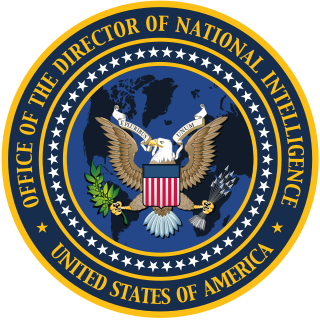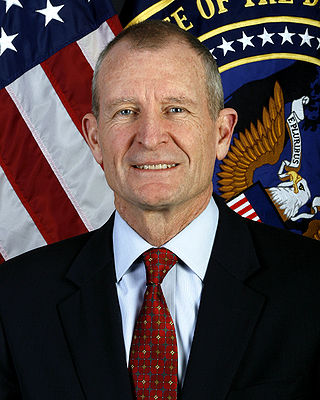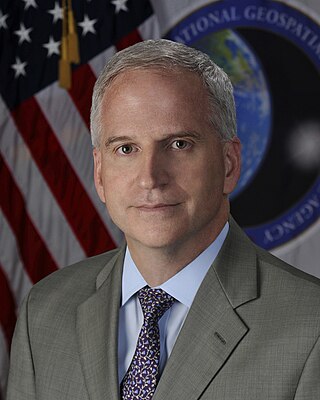
The Defense Intelligence Agency (DIA) is an intelligence agency and combat support agency of the United States Department of Defense, specializing in defense and military intelligence.

The director of national intelligence (DNI) is a senior cabinet-level United States government official, required by the Intelligence Reform and Terrorism Prevention Act of 2004 to serve as executive head of the United States Intelligence Community (IC) and to direct and oversee the National Intelligence Program (NIP). All IC agencies report directly to the DNI. The DNI also serves, upon invitation, as an advisor to the president of the United States, the National Security Council and the Homeland Security Council on all intelligence matters. The DNI, supported by the Office of the Director of National Intelligence (ODNI), produces the President's Daily Brief (PDB), a classified document including intelligence from all IC agencies, handed each morning to the president of the United States.

The United States Intelligence Community (IC) is a group of separate U.S. federal government intelligence agencies and subordinate organizations that work both separately and collectively to conduct intelligence activities which support the foreign policy and national security interests of the United States. Member organizations of the IC include intelligence agencies, military intelligence, and civilian intelligence and analysis offices within federal executive departments.

The National Intelligence Distinguished Service Medal (NIDSM) is a decoration awarded for service to the United States Intelligence Community. The decoration is awarded to any member or contributor to the National Intelligence Community, either civilian or military, who distinguishes themselves by meritorious actions to the betterment of national security in the United States of America, through sustained and selfless service of the highest order.

The director of the Central Intelligence Agency (D/CIA) is a statutory office that functions as the head of the Central Intelligence Agency, which in turn is a part of the United States Intelligence Community.

Dennis Cutler Blair is the former United States Director of National Intelligence and a retired United States Navy admiral who was the commander of U.S. forces in the Pacific region. Blair was a career officer in the U.S. Navy and served in the White House during the presidencies of both Jimmy Carter and Ronald Reagan. Blair retired from the Navy in 2002 as an Admiral. In 2009, Blair was selected as President Barack Obama’s first Director of National Intelligence, but after a series of bureaucratic battles, he resigned on May 20, 2010.

The National Center for Medical Intelligence (NCMI), formerly known as the Armed Forces Medical Intelligence Center, is a component of the United States Defense Intelligence Agency (DIA) responsible for the production of medical intelligence and all-source intelligence on foreign health threats and other medical issues to protect U.S. interests worldwide. Headquartered at Fort Detrick, Maryland, the center provides finished intelligence products to the Department of Defense, U.S. Intelligence Community, Five Eyes, NATO, allies and partners, as well as international health organizations and NGO's.

Joseph Maguire is an American officer who served as Director of the National Counterterrorism Center and Acting Director of National Intelligence under President Donald Trump. He retired from the United States Navy as a vice admiral in 2010 after 36 years of military service. Prior to retiring from active duty, he was the deputy director for strategic operational planning at National Counterterrorism Center (NCTC).

Lieutenant General Michael David Maples, USA served as the 16th Director of the Defense Intelligence Agency (DIA), appointed on November 4, 2005. He was promoted to lieutenant general on November 29. Maples also commanded the Joint Functional Component Command for Intelligence, Surveillance and Reconnaissance (JFCC-ISR) for the United States Strategic Command (USSTRATCOM). He transferred his Directorship of the Defense Intelligence Agency and his command of JFCC-ISR to LTG Ronald Burgess on March 18, 2009. Maples formally served as the vice director of management of the Joint Staff.

The under secretary of defense for intelligence and security or USD(I&S) is a high-ranking civilian position in the Office of the Secretary of Defense (OSD) within the U.S. Department of Defense (DoD) that acts as the principal civilian advisor and deputy to the secretary of defense (SecDef) and deputy secretary of defense (DepSecDef) on matters relating to military intelligence and security. The under secretary is appointed as a civilian by the president and confirmed by the Senate to serve at the pleasure of the president.

Lieutenant General Ronald Lee Burgess Jr., United States Army is a retired United States Army lieutenant general. His last military assignment was as the 17th director of the Defense Intelligence Agency and commander of the Joint Functional Component Command for Intelligence, Surveillance and Reconnaissance (JFCC-ISR). Prior to that, he was Director of the Intelligence Staff in the Office of the Director of National Intelligence.

The United States Department of Defense is an executive branch department of the federal government of the United States charged with coordinating and supervising all agencies and functions of the U.S. government directly related to national security and the United States Armed Forces. As of June 2022, the U.S. Department of Defense is the largest employer in the world, with over 1.34 million active-duty service members, including soldiers, marines, sailors, airmen, and guardians. The Department of Defense also maintains over 778,000 National Guard and reservists, and over 747,000 civilians bringing the total to over 2.87 million employees. Headquartered at the Pentagon in Arlington County, Virginia, just outside Washington, D.C., the Department of Defense's stated mission is to provide "the military forces needed to deter war and ensure our nation's security".

The Office of Intelligence and Counterintelligence (OICI), also abbreviated IN, DOE-IN, DOE/IN, I&CI, or OIC, was established in 2006 by the merger of pre-existing Energy Department intelligence and security organizations. It is an office of the United States Department of Energy (DOE) responsible for all intelligence and counterintelligence activities throughout the DOE complex; due to this central role, OICI is designated DOE's Headquarters Intelligence. As a component of the United States Intelligence Community in addition to the Department of Energy, OICI reports to both the Director of National Intelligence and Secretary of Energy.

James Robert Clapper Jr. is a retired lieutenant general in the United States Air Force and former Director of National Intelligence. Clapper has held several key positions within the United States Intelligence Community. He served as director of the Defense Intelligence Agency (DIA) from 1992 until 1995. He was the first director of defense intelligence within the Office of the Director of National Intelligence and simultaneously the Under Secretary of Defense for Intelligence. He served as the director of the National Geospatial-Intelligence Agency (NGA) from September 2001 until June 2006.

The United States intelligence budget comprises all the funding for the 18 agencies of the United States Intelligence Community. These agencies and other programs fit into one of the intelligence budget's two components, the National Intelligence Program (NIP) and the Military Intelligence Program (MIP). As with other parts of the federal budget, the US intelligence budget runs according to the Fiscal year (FY), not the calendar year. Before government finances are spent on intelligence, the funds must first be authorized and appropriated by committees in both the United States House of Representatives and the United States Senate.

Patrick M. Hughes is a retired United States Army officer who served as the 12th Director of the Defense Intelligence Agency (DIA). Previously, he was Director of Intelligence for the US Joint Chiefs of Staff from 1994 to 1996 and the Director of Intelligence at United States Central Command from 1992 to 1994. He was the Commanding General, United States Army Intelligence Agency, and the Assistant Deputy Chief of Staff for Intelligence, U.S. Army from 1990 until 1992. He joined the United States Department of Homeland Security in 2003 as the Assistant Secretary for Information Analysis (Intelligence), and departed from DHS and Government service in March 2005.

Robert Cardillo is a Distinguished Fellow at Georgetown University’s Center for Security and Emerging Technology. Prior to this appointment, he was the sixth Director of the National Geospatial-Intelligence Agency and was sworn in October 3, 2014. He was previously selected by Director of National Intelligence James Clapper to serve as the first Deputy Director of National Intelligence for Intelligence Integration in September 2010. Clapper said in a statement that the position would "elevate information sharing and collaboration" between those who collect intelligence and those who analyze it. Cardillo previously served as deputy director of the Defense Intelligence Agency (DIA). Prior to that, he served as the deputy director for Analysis, DIA, and Director, Analysis and Production, National Geospatial-Intelligence Agency (NGA).

Scott David Berrier was a lieutenant general in the United States Army who served as the Director of the Defense Intelligence Agency from 2020 to 2024. Berrier was confirmed by the United States Senate as the 22nd Director of the Defense Intelligence Agency on July 30, 2020, replacing the retiring Lieutenant General Robert P. Ashley Jr. He previously served as the Deputy Chief of Staff of the Army G-2 (intelligence). He received his officer's commission in 1983 through the ROTC program at the University of Wisconsin–Stevens Point.




























